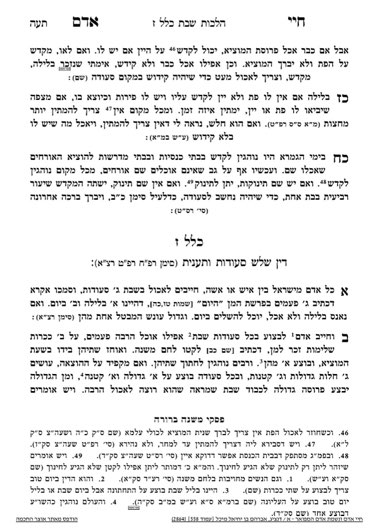The current series, which will cover seudos Shabbos and fasting on Shabbos, is available for sponsorship. Please contact Rabbi Reingold for more information.
We are continuing in siman 2, discussing the halachos of lechem mishneh. The Chayei Adam writes that when a person is about to be motzi others in a bracha, he should preface the bracha with the words birshus rabbosai. These words mean that the person making the bracha is only reciting it with the permission of the others. In other words, technically the others should recite the bracha, but they gave me permission to do so.
When one is a guest, it is certainly understandable why it would be appropriate to say birshus, to ask the permission of the baal habayis. Nevertheless, the Chayei Adam clarifies that even if the baal habayis or greatest person in the room is making the bracha, they should still say birshus. The Chayei Adam explains that it is an expression of humility in those situations that even though the baal habayis or greatest person in the room do not need to ask birshus, they still do nonetheless.
The sefer Maaseh Rav is a compilation of different practices of the Vilna Gaon, as witnessed by his talmidim. The Gemara says that if a person witnesses another person who is of stature doing a particular action, it carries its weight in halacha, and one can assume it is halachically correct. This idea is known as maaseh rav, that a story is great for learning. Thus, the talmidim of the Gra named their sefer Maaseh Rav.
In the sefer, they write that the Gra did not ask reshus from others. They point out that the Gemara itself says that even the baal habayis should recite birshus, however they explain that the Gemara is referring to birchas hamazon. Preferably, birchas hamazon should be given to a guest. Therefore, the baal habayis asks for permission out of humility. However, at the beginning of the meal, the Gra was of the opinion not to recite birshus, since there is no need to ask permission since the appropriate person to say the bracha is either the baal habayis or the greatest person present. Therefore, it is an unnecessary hefsek between netilas yadayim and hamotzi.
Nevertheless, the minhag is to follow the Rema and recite birshus before saying hamotzi when one will be motzi others, because it is an appropriate practice of humility. If the person reciting hamotzi is concerned that people will not pay attention unless he “warns” them with birshus, they should say birshus, even according to the Gra, to attain everyone’s attention.
When it comes to kiddush, the primary language is savrai (or savri), which comes from the word savar, interest or attention. Savrai was primarily introduced to call attention to the bracha on wine. The bracha on wine is recited on wine brought out during the meal. People who were eating needed to stop and pay attention, so savrai was said. Even with kiddush, which is before the meal, and people are not eating and distracted yet, we continue to use the language of savrai. This language is not an expression of humility at all, and not connected to asking for permission.
Since savrai was primarily introduced to call attention to the bracha, it is totally irrelevant to hamotzi, which is always said when people are not distracted, at the beginning of the meal. Even in a scenario where attention needs to be called for the “hamotzi”, the language doesn’t change, and birshus is used.
Summary
One should add birshus before saying hamotzi, when they are motzi others.



